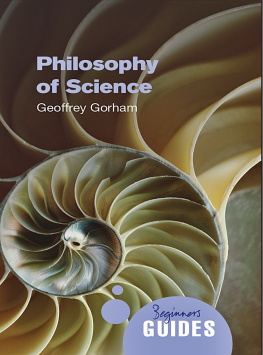Philosophy of Science
A Beginners Guide
ONEWORLD BEGINNERS GUIDES combine an original, inventive, and engaging approach with expert analysis on subjects ranging from art and history to religion and politics, and everything in between. Innovative and affordable, books in the series are perfect for anyone curious about the way the world works and the big ideas of our time.
aesthetics
africa
anarchism
aquinas
art
artificial intelligence
the bahai faith
the beat generation
biodiversity
bioterror & biowarfare
the brain
british politics
the buddha
cancer
censorship
christianity
civil liberties
classical music
climate change
cloning
cold war
conservation
crimes against humanity
criminal psychology
critical thinking
daoism
democracy
descartes
dyslexia
energy
engineering
the enlightenment
epistemology
evolution
evolutionary psychology
existentialism
fair trade
feminism
forensic science
french revolution
genetics
global terrorism
hinduism
history of science
humanism
islamic philosophy
journalism
judaism
lacan
life in the universe
literary theory
machiavelli
mafia & organized crime
magic
marx
medieval philosophy
middle east
NATO
nietzsche
the northern ireland conflict
oil
opera
the palestineisraeli conflict
paul
philosophy of mind
philosophy of religion
philosophy of science
planet earth
postmodernism
psychology
quantum physics
the quran
racism
renaissance art
shakespeare
the small arms trade
the torah
sufism
volcanoes


A Oneworld Paperback Original
Published by Oneworld Publications 2009
This ebook edition published by Oneworld Publications 2012
Copyright Geoffrey Gorham 2009
The moral right of Geoffrey Gorham to be identified as the
Author of this work has been asserted by him in accordance with the
Copyright, Designs and Patents Act 1988
All rights reserved
Copyright under Berne Convention
A CIP record for this title is available
from the British Library
ISBN 9781851686841
ebook ISBN 9781780741758
Typeset by Jayvee, Trivandrum, India
Cover design by www.fatfacedesign.com
Oneworld Publications
10 Bloomsbury Street, London, WC1B 3SR
Stay up to date with the latest books, special offers, and exclusive content from Oneworld with our monthly newsletter
Sign up on our website
www.oneworld-publications.com
Illustrations
Introduction: What is philosophy of science?
While science is a relatively recent product of human culture, the drive to understand our natural surroundings seems to be a deep and distinctive feature of human nature. As Aristotle perhaps the first great scientist (and philosopher of science) observed All men by nature desire to know. This same curiosity that encourages science gives rise to philosophical reflection about science. Thus it has always seemed remarkable to scientists that humans have not only the desire but also the capacity to understand nature and that nature has the capacity to be understood. In this vein, Albert Einstein declared paradoxically that the eternal mystery of the world is its comprehensibility. Solving this mystery is one of the fundamental and abiding problems of philosophy of science. Perhaps, as philosophers even before Aristotle speculated, nature has an inherent language or logos that somehow suits it for human comprehension. Or perhaps scientific theories merely project human categories onto an otherwise indifferent and inscrutable world. Is the world discovered or constructed by science? As we will see in chapters four and five below, this ancient question is still hotly debated in philosophy of science today.
But a word about philosophy. Since the label is derived from the Greek words for love (philia) and knowledge or wisdom (sophia) a philosopher is literally just a lover of knowledge. But this doesnt capture the precise nature of philosophical inquiry. Presumably, non-philosophers such as doctors and lawyers (maybe even some politicians) love knowledge too. But whereas these fields are directed at knowledge or expertise in specific subjects, philosophy ranges very broadly over every area of human concern. With the possible exception of logic, philosophy doesnt really possess an established body of knowledge like math or history. Indeed, philosophers rarely agree among themselves about even the most basic issues in their field. What distinguishes philosophy from the other disciplines is its concern with fundamental problems and concepts at the core of any human activity or interest: the nature of knowledge, the structure of reality, the meaning and value of life, and so on. To be sure, philosophy puts forth its share of definite theories and claims (some possibly true; many quite outlandish). But these are properly philosophical theories and claims because they answer to the hope of understanding and clarifying the really basic issues. Put briefly, philosophy is the attempt to get to the bottom of things.
Accordingly, philosophy of science is the attempt to answer fundamental questions about science. Is scientific knowledge different from other sorts of knowledge? Is science getting closer to the absolute truth? Is science influenced by politics and gender? How are the various sciences related to one another? In addition, there are philosophical questions that arise within particular sciences, like psychology (could a machine think?), physics (is the world deterministic?) and biology (does evolution have a built-in tendency to complexity?). And in this book we will frequently have occasion to touch on these field-specific questions. But our main concern will be the big questions about the nature of science itself.
Although the philosophy of science only emerged as a professional sub-discipline of academic philosophy with its own journals, courses, associations, etc. in the twentieth century, it is really as old as philosophy itself (i.e. very old indeed). This is because philosophers, as lovers of knowledge, have always been impressed with the power and depth of scientific knowledge. Many of the greatest philosophers in the Western tradition were (at least part-time) philosophers of science: Aristotle, Descartes, Hume, Kant, Mill, and Russell, to name a few. In fact, the very distinction between philosophy and science is relatively new. Before the nineteenth century, there was simply philosophy or natural philosophy. Isaac Newtons masterwork in mechanics is titled The Mathematical Principles of Natural Philosophy. And although philosophy may not come up routinely in the daily practice of science, problems at the cutting edge of science will often turn on deep philosophical issues about time and space, causality, and experience. So its not surprising that some of the greatest scientists have been profoundly philosophical in their orientation. Along with Newton, this can also be said of Galileo, Darwin, Niels Bohr, Albert Einstein, Stephen Jay Gould, and Stephen Hawking. And as we shall see in a moment the very earliest scientists were simply philosophers who took a special interest in the natural world.












